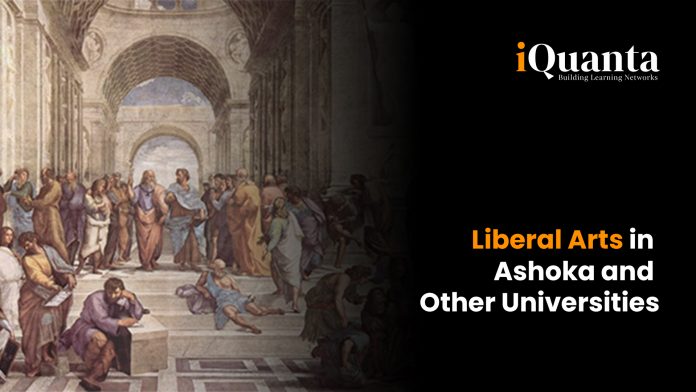INTRODUCTION
Liberal Arts degree program is an interdisciplinary covering topic within the humanities as well as social, natural and formal sciences. Liberal Arts is a multidisciplinary system of education that includes a diverse mix of subjects from various disciplines including humanities, sciences, commerce, and technology.
It helps to develop well rounded individuals with general knowledge with a wide range of subjects and with mastery of a range of transferable skills.
Course Structure of Liberal Arts Program
Liberal Arts program is typically spread across 3 verticals: Major, Minor, and Foundation
A Major is the field in which a student focuses during his/her degree. Majors can either be Pure Majors (Computer Science, English, History, Biology, and more) or Interdisciplinary Majors (Politics, Philosophy & Economics; Computer Science & Entrepreneurial Leadership; English & Creative Writing; Politics & Society; History & International Relations; English & Media Studies).
A Minor is a secondary concentration of courses that often complements the Major. Few choices when it comes to a Minor subject are:
- Performing Arts
- Visual Arts
- Entrepreneurship
- Environmental studies
- International Relations
- Media Studies
- Creative Writing
Foundation Courses are distinctive courses that introduce students to various styles of thinking, but also to inter-disciplinary and transdisciplinary approaches.
Some of the choices are:
- Environmental Studies
- Great Books
- Indian Civilization
- Introduction to Mathematical Thinking Literature & the World
- Mind & Behaviour
- Principles of Science
- Social & Political Formation
Career Opportunities
- Economist
- Archaeologist
- Sociologist
- Psychologist
- Public Relations Specialist
- Human Resources Specialists
- Graphic Designer or Artist
- Writer
- Social Worker
- Teacher
- Institutions
- Colleges Location
- Jindal School Of Liberal Arts and
- Humanities
Institutions
| Colleges | Location |
| Jindal School Of Liberal Arts and Humanities | Sonipat |
| Ashoka University | Sonipat |
| Symbiosis School For Liberal Arts | Pune |
| NMIMS School of Liberal Arts | Mumbai |
| Amity University | Gurgaon/Lucknow/Jaipur |
| Flames University | Pune |
College Details
1) Jindal School Of Liberal Arts and Humanities, Sonipat
- Course Offered: B.A. (Hons.) Liberal Arts and Humanities
- Duration: 3 Years
- Eligibility criteria: 10+2 Level
- Selection process: Entrance Test-JAT
- Duration of the exam – 2 hours
- Type of Questions- MCQ
- Syllabus: Mathematics, Reasoning and Analytical Ability
2) Ashoka University, Sonipat
- Course: B.A. (Hons) , B.Sc. (Hons)
- Eligibility: 10+2 level
Selection process:
- Entrance Test – Ashoka Aptitude Test
- On-the-spot essay
- Interview with a panel
3) Symbiosis School For Liberal Arts, Pune
- Course Offered: BACHELOR OF SCIENCE (LIBERAL ARTS)
- Duration: 4 Years
- Eligibility criteria: (10+2) pass from any branch with minimum 50% marks for the general category
- Selection process: Entrance Exam-SET + Personal Interaction & Writing Ability Test (PI-WAT)
4) NMIMS School of Liberal Arts, Mumbai
- Course Offered: B. A. (Hons) – Liberal Arts
- Duration: 3 years
- Eligibility criteria: 10+2 with 60%
- Selection process: Entrance+ Interview
5) Amity University , Gurgaon/Lucknow/Jaipur
- Course Offered: LIBERAL ARTS
- B.A. (Hons) – History/ Philosophy/ Political Science
- Bachelor of Social Work
- Selection process: English Essay + Interview
6) Flames University, Pune
- Course Offered: Flame Diploma in Liberal Education (BA /BBA)
- Duration: 3 years
- Eligibility criteria: 10+2 with minimum 40 %
- Selection process: Entrance Exam-FEAT (Flame Entrance Aptitude Test) or SAT + GD+ Interview+ (10+2) Marks + ECA+SOP
SKILL SET
- Analytical thinking.
- Creative thinking.
- Effective with ambiguity.
- Listening Skills
- Problem Solving Skills
- Writing Skills
- Reading Comprehensive Skills
- Communication Skills
- Numeracy
- Research
- Practice humility, tolerance and self-criticism
- Foreign languages and cross-cultural knowledge
- Learning and synthesizing new ideas
ELIGIBILITY
- Clear 10+2 / equivalent examination with at least 50% marks in aggregate.
- Some of the universities and institutes conduct an entrance examination for admission.
SPECIALISATION
- Environmental sciences
- Great Books
- International Relations
- Business Studies
- Mathematics
- Indian Civilization
- Literature and The world
- Mind and Behaviour
- Computer Science
- Principles of Science
- Public Affairs and Policies
- Film studies
KEY ROLES & RESPONSIBILITIES
- Analysis of data and information to find facts ,trends, reason behind situations
- Communicating with people in writing ,verbally with co workers
- Developing new ideas, concepts, innovative solutions to problems, newer ways of getting things done, designing products and services, creating work of arts and crafts etc.
- Updated with the latest knowledge relevant to the fields of work and use of the relevant knowledge in getting things done
- Using Computer software for various applications in day to day professional work entering data and process information
- Developing Team ,maintaining professional relationships among Team members

